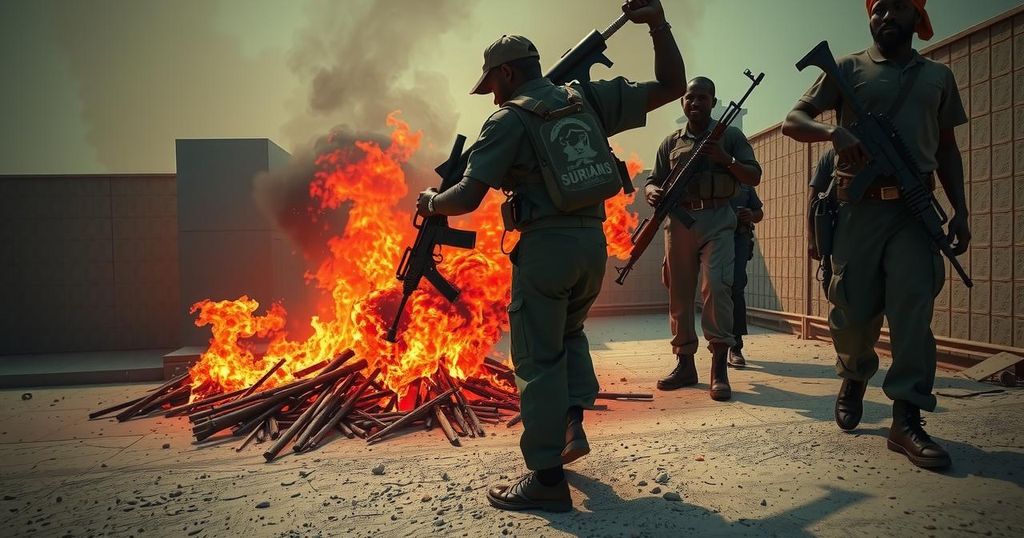U.S. Accusations of Genocide Against Sudanese Militias: A Comparison with Israel

The U.S. accuses Sudanese militias of genocide due to severe humanitarian crises while simultaneously defending Israel despite similar accusations. Secretary of State Blinken cited extensive civilian suffering in Sudan, contrasting the U.S. administration’s responses and apparent biases in addressing alleged war crimes committed by allied and adversarial forces.
The United States has formally accused Sudan’s Rapid Support Forces (RSF) and its allied militias of committing genocide amid the ongoing conflict with the Sudanese Armed Forces, which erupted in April 2023. Secretary of State Antony Blinken cited grave humanitarian conditions in Sudan, including famine affecting 638,000 individuals and over 30 million requiring assistance, alongside tens of thousands of deaths, to justify this claim. In stark contrast, the U.S. administration has, to this point, defended Israel despite facing similar accusations regarding its military actions against Palestinians.
The classification of genocide, as defined under the 1948 Genocide Convention, involves acts committed with the intent to destroy, wholly or partially, a national, ethnical, racial, or religious group. Notably, Secretary Blinken’s statements highlighted reports of targeted violence against specific ethnic groups by the RSF, including sexual violence. These allegations echo long-standing criticisms directed at Israeli armed forces, which human rights organizations have repeatedly claimed engage in similar acts against the Palestinian population.
Despite substantial evidence marking Israel’s conduct as potentially genocidal or as war crimes, the U.S. has refrained from adopting analogous terminology. President Biden, for instance, dismissed calls to investigate Israeli leaders for potential war crimes and publicly criticized international attempts to curtail Israeli military actions in Gaza. U.S. National Security Council spokesperson John Kirby described allegations against Israel as “completely without any basis in fact whatsoever.”
The situation in Gaza remains dire, with casualty figures reportedly exceeding 45,000 and consistent claims of ethnic cleansing and starvation as warfare tactics. The Biden administration has exercised its veto power in the UN Security Council to block ceasefire initiatives and continued arms sales to Israel, demonstrating a pronounced disparity in its response to alleged human rights violations committed by allied versus adversarial states.
In conclusion, the contrasting U.S. stances towards the RSF in Sudan and the Israeli forces reveals a complex interplay of geopolitical alliances, humanitarian considerations, and international law. The lack of coherent terminology and response to Israel’s actions raises significant questions about the U.S. commitment to human rights and accountability across different scenarios.
This article scrutinizes the recent accusations leveled by the United States against Sudanese militias for committing genocide during an ongoing conflict while contrasting this with the U.S. government’s defense of Israel amid accusations of similar atrocities. The analysis focuses on U.S. Secretary of State Antony Blinken’s statements regarding the RSF in Sudan and the implications of U.S. foreign policy on international law and human rights. It further examines public sentiments and international responses concerning both regions’ humanitarian crises, elucidating inconsistencies in U.S. government rhetoric and actions.
The allegations of genocide against the RSF compel reflection on the U.S. Government’s differential treatment of international actors engaged in violence against ethnic groups. While the administration has acknowledged the critical humanitarian situation in Sudan, it continues to shield Israel from similar allegations despite significant scrutiny of its military actions. This discrepancy illustrates the complexities and challenges within U.S. foreign policy regarding human rights interventions and international legal frameworks.
Original Source: www.aljazeera.com








